-

新人教版高中英语必修3Unit 3 Diverse Cultures-Reading and Thinking教学设计
Discuss these questions in groups.Q1: Have you ever been to a place that has a diverse culture ? What do you think about the culture diversity ?One culturally diverse place that I have been to is Harbin, the capital city of Heilongjiang Province. I went there last year with my family to see the Ice and Snow Festival, and I was amazed at how the culture as different to most other Chinese cities. There is a big Russian influence there, with beautiful Russian architecture and lots of interesting restaurants. I learnt that Harbin is called “the Oriental Moscow” and that many Russians settled there to help build the railway over 100 years ago.Q2: What are the benefits and challenges of cultural diversity ?The benefits: People are able to experience a wide variety of cultures, making their lives more interesting, and it can deepen the feelings for our national culture, it is also helpful for us to learn about other outstanding culture, which helps improve the ability to respect others. The challenges: People may have trouble communicating or understanding each other, and it may lead to disappearance of some civilizations and even make some people think “The western moon is rounder than his own.”Step 7 Post reading---RetellComplete the passage according to the text.Today, I arrived back in San Francisco, and it feels good (1) _____(be) back in the city again. The city succeeded in (2)_________ (rebuild) itself after the earthquake that (3)________ (occur) in 1906, and I stayed in the Mission District, enjoying some delicious noodles mixed with cultures. In the afternoon, I headed to a local museum (4)____ showed the historical changes in California. During the gold rush, many Chinese arrived, and some opened up shops and restaurants in Chinatown to earn a (5)_____ (live). Many others worked on (6)______ (farm), joined the gold rush, or went to build the railway that connected California to the east. The museum showed us (7)____ America was built by immigrants from (8)________ (difference) countries and cultures. In the evening, I went to Chinatown, and ate in a Cantonese restaurant that served food on (9)________(beauty) china plates. Tomorrow evening, I’m going to (10)__ jazz bar in the Richmond District. 答案:1. to be 2. rebuilding 3. occurred 4. that 5.living6. farms 7.how 8. different 9. beautiful 10. a

新人教版高中英语必修3Unit 4 Space Exploration-Discovering Useful Structure教学设计
The theme of the section is “Describe space facts and efforts to explore space”. Infinitives are one of non-finite verbs, as the subjects, objects, predicative, attributes and adverbials. This unit is about space exploration, which is a significant scientific activity, so every scientific activity has strong planning. Therefore, using the infinitives to show its purpose, explanations or restrictions is the best choice.1. Learn the structure, functions and features of infinitives.2. Learn to summarize some rules about infinitives to show purpose and modify.3. Learn to use infinitives in oral and writing English. 1. Learn the structure, functions and features of infinitives.2. Learn to summarize some rules about infinitives to show purpose and modify.3. Learn to use use infinitives in oral and writing English.Step 1 Lead in---Pair workLook at the following sentences and focus on the italicized infinitives. In pairs, discuss their functions. 1. I trained for a long time to fly airplanes as a fighter pilot..(作目的状语)2. As we all know, an astronaut needs to be healthy and calm in order to work in space..(作目的状语)3. First of all, you must be intelligent enough to get a related college degree..(作目的状语)4. Some scientist were determined to help humans realise their dream to explore space..(作定语)5. On 12 April 1961, Yuri Gagarin became the first person in the world to go into space..(作定语)Summary:1. 不定式的结构:to+do原形。2. 分析上面的句子,我们知道在描述太空探索时,动词不定式不仅可以用来表目的,还可以用来作定语,表修饰。

新人教版高中英语必修3Unit 4 Space Exploration-Listening&Speaking&Talking教学设计二
The themes of this part are “Talk about how to become an astronaut” and “Talk about life in space”. As Neil Armstrong said “Mystery creates wonder and wonder is the basis of man’s desire to understand. Space is difficult for human to reach, therefore, humans are full of wonders about it. However, if wanting to achieve the dream of reaching the Moon, some of our human should work hard to be an astronaut at first. Part A(Talk about how to become an astronaut) is a radio interview in a radio studio, where the host asked the Chinese astronauts about his story how to become an astronaut. Yang Liwei told his dreamed to be an astronaut since childhood. Then he worked hard to get into college at 22. The next 10 years, he gradually became an experienced pilot. At the same time, to be an astronaut, he had to study hard English, science and astronomy and trained hard to keep in good physical and mental health and to practise using space equipment. Part B (Talk about life in space) is also an interview with the astronaut Brown, who is back on the earth. The host Max asked about his space life, such as his emotion about going back the earth, the eating, shower, brushing, hobbies and his work. Part A and Part B are interviews. So expressing curiosity about the guests’ past life is a communicative skill, which students should be guided to learn.1. Students can get detailed information about how Yang Liwei became an astronaut and Max’s space life.2. Students learn to proper listening strategy to get detailed information---listening for numbers and taking notes.3. Students can learn related sentences or phrases to express their curiosity like “ I wish to know...” “I’d love to know...”4. Students can learn more about the space and astronauts, even be interested in working hard to be an astronaut

新人教版高中英语必修3Unit 4 Space Exploration-Reading and Thinking教学设计二
The theme of this unit focuses on “space exploration.” Students will learn about the training and experience needed to become an astronaut. The text is mainly about the development of space exploration. On the one hand, the text helps students to have a good understanding about the great feats humans have achieved, on the other hand, they will further understand the contributions that we Chinese have achieved, and feel confident and proud about our homeland and strengthen their love for our country. The teacher should instruct students to aim high and study harder to make great progress in the space career if possible.1. Read about the development and value of space exploration.2. Explore the mysteries of the universe and the achievements in space exploration.3. Skillfully use the vocabulary of this text to cultivate self-study ability 4. Develop cooperative learning ability through discussion.1. Enable the Ss to talk about the development and value of space exploration.2. Guide the Ss to summarize the main idea of each paragraph as well as the main idea of the text.3. Help Ss comprehend the main reasons for space exploration. Multi-media, textbook, notebooks.Step 1: Warming up and predictionLook at the title and the pictures of the text and predict what the text will be about?2. What are the main reasons for space exploration?

新人教版高中英语必修3Unit 4 Space Exploration-Reading for Writing教学设计二
⑦在我看来, 探索太空是值得的。As far as I am concerned, it is worthwhile to explore the space.Step 10 Writing---draftRecently, students in our class have had heated a discussion on whether space is worth exploring. Students hold different ideas about it.30% of us think space exploration is not worthwhile. They think space is too far away from us and our daily life and is a waste of money. And the money spent on space exploration can be used to solve the earth’s problems such as starvation and pollution.On the other hand,70% think space is worth exploring because we have benefited a lot from it,such as using satellites for communication and weather forecast. What’s more,with further space research,we may solve the population problem by moving to other planets one day. Also,space research will enable us to find new sources to solve the problem of energy shortages on the earth.As far as I am concerned, it is worthwhile to explore the space. Not only can it promote the development of society but also enrich our life. Step 11 Pair workExchange drafts with a partner. Use this checklist to help your partner revise his/her draft.1.Does the writer explain why he/she changed/wanted to change?2.Does the writer tell how the changes have improved or will improve his/her life?3.Is the text well-organised?4.Does the writer use words and expressions to show similarities and differences?5.Are there any grammar or spelling errors?6.Does the writer use correct punctuation?

新人教版高中英语必修3Unit 5 The Value of Money- Discovering Useful Structure教学设计
Step 3 Meaning1. 过去将来时表示从过去某一时间来看将要发生的动作或存在的状态, 常用在宾语从句中。一般由“would/should +动词原形”构成。She hoped that they would meet again someday. 她希望将来有一天他们能再见面。2. was/were going to+动词原形: 表示过去将要发生或很有可能发生的动作, 常用于口语中, 表示预言、意图或者打算等。He was going to start work the following week. 他打算下星期开始工作。3. was/were about to do: 常用来表示即将发生的动作, “刚要/正要做……”。注意该结构不与任何时间状语连用。I felt that something terrible was about to happen. 我感到某种可怕的事情即将发生。4.was/were to do: 表示“曾计划做某事”, 如果表示“本来计划做某事, 动作没实现”, 则需用 “was/were to have done”。She said she was to have told me about the accident. 她说她本来想告诉我关于事故的事。5.Start, go, come, leave, see, meet等动词的过去进行时: 表示就过去某一时刻而言即将发生的动作。She was coming later. 她随后就来。I had just put on my overcoat and was leaving to visit a friend of mine. 我刚穿上外套要去看我的一个朋友。

新人教版高中英语必修3Unit 5 The Value of Money-Listening &Speaking&Talking教学设计
4. A:We’d like to have someone to say a word at the beginning to welcome the group.B:↙Who?A:We thought that you or Dr.Johnson might do it.B用降调说Who,其意思是问,对方想让谁在开场时致欢迎词。Step 6 Pronunciation---Practice1. Listen to the short conversation and mark the intonation with ↗, ↙ or ↙, ↗. Then discuss with a partner what they intend to convey by using different intonation.Owner: You know what ?↗ It’s a million-pound bank note↙.Waiter 1: Really ?↗(question)Waiter 2: Really !↙(unbelievable and surprised)Waiter 3: Really ?!↙↗(first question then surprised)2. Listen to the conversations. Underline the parts that are stressed and mark the intonation. Then talk about the implied meanings of the responses with different intonations. Listen again and repeat.1) Henry: It’s a nice suit.Owner: Oh, it’s perfect!↙(The intonation means it is very suitable for Henry.)2) Henry: Well, that’s very kind of you.Owner: Kind, sir ?↗(what you said is not right) No, it’s kind of you. You must come whenever you want and have whatever you like. Just having you sit here is a great honour !!↙(welcome you to come again)3)Henry:Well, to be honest, I have none. Oliver:(happily) What luck!(excited) Brother↗, what luck!↙(It means “Didn’t you hear it?”)Henry: Well, it may seem lucky to you but not to me!↗(angry) If this is your idea of some kind of joke, I don’t think it’s very funny. Now if you’ll excuse me, I ought to be on my way.↙(If so, I would leave.)Roderick: Please don’t go↙...(hope Henry can wait for a moment)Part B Viewing and Talking---Describe people’s changing attitudes in a film clipStep 1 Before-listening---Tell the filmYou are going to watch part of the film The Million Pound Bank Note. Look at these photos and guess what happens in the film.

新人教版高中英语必修3Unit 5 The Value of Money-Listening &Speaking教学设计
Step 4: Listen again and decide if the following statements are true (T) or false (F).1 It was the first time Chen Liyan's story was reported. T口 F口2 Chen found 10,000 yuan in a small plastic bag in Taiyuan railway station口 F口3 Wang Zheng apologized to Chen because he couldn't offer her more money. T口 F口4 Chen took out a large loan to cure her daughter, T口 F口5 Wang set up a fundraising website for Chen's daughter after Chen told him about her situation. T口 F口Step 5:After listening, discuss the questions.1 What kind of person do you think Chen Liyan is?Chen Liyan is generous and honest because she returned a large sum of money to the owner.2 Did Chen return the money because she didn't need it?No. She returned the money because it was the right thing to do. Evidence for this is that she refused to accept the reward money because she felt that it had not been earned. 3 Is it common for people to do what Chen did?It depends on the culture. In some countries it is quite common to return money that has been found. In other countries, people believe "Finders are keepers!" 4 How did Wang Zheng feel about the return of his money?He must have been very happy and relieved to have gotten his money back. We know this because he thanked Chen repeatedly and even offered her a reward.5 Why did Ma Dongbao tell Wang about Chen's family?He must have had great sympathy for Chen and her daughter and wanted to help them.'We know this because he arranged help for them. 6 How did the news reporter feel about Chen's actions?The news reporter felt that it showed that money wasn't the most important thing in life. We know this because the reporter told us that this is what Chen believes. and then said, “that's a great attitude to take."

新人教版高中英语必修3Unit 5 The value of money-Reading and Thinking教学设计二
? Could you offer me some kind of work here?? I don’t want your charity, I just want an honest job.? Careless: I landed in Britain by accident.Step 7:Consolidation.? Find Henry? Roderick and Oliver were I .making a bet when they saw Henry, a poor young man. ? Know Henry? About a month ago, Henry was sailing and later he found himself carried out to sea by a strong wind. Fortunately, he 2.was spotted by a ship. And it was the ship that brought him to 3.England? Offer money to Henry ? Oliver and Roderick gave Henry a letter and told him that there was money in it. They 4.persuaded him to accept it, and made him 5.promise that it wouldn't be opened until 2 o'clock.Step 8:Language pointsa large amount of: a large quantity of; a great deal ofe.g. They bought a large amount of furniture before they moved their new house.make a bet: make an arrangement to risk money, etc. on an event of which the result is doubtful.e.g. We made a bet on the result of the match.permit sb to do something: allow somebody to do somethinge.g. My mother doesn’t permit me to ride in the street after it rained.by accident: as a result of chancee.g. I only found it by accident.stare at: look at somebody or something with the eyes wide open in a fixed gaze( in astonishment, wonder, fear, etc)to be honest: to tell you the truth; to be franke.g. To be honest, I don’t think we have a chance of winning.Step7 Homework:What do you think will happen to Henry? Will the bank-note help him or get him into trouble?

新人教版高中英语必修3Unit 5 The Value of Money-Reading for Writing教学设计二
2. 您能看到, 我头发太长了。You can see that my hair is much too long.3. 无论什么时候, 只要您想回来就回来。Please come back whenever you want.4. 您仅有很少的头发要理! You only have too little hair to cut !5. 为您服务是我的荣幸!It is my honour to serve you!Step 9 Writing(Henry is walking down the street when he sees a sign for a place that cuts hair. He decides to have it cut. )H=Henry B=BarberH: Good afternoon, I’d like to have my hair cut, if I may. (The barber looks at Henry’s hair and continues cutting another man’s hair. ) Er, I’d really like a haircut. As you can see it’s much too long. B: (in a rude manner) Yes, I can see that. Indeed, I can. H: Fine, well, I’ll have a seat then. (He sits in one of the barber’s chairs. The barber turns to look at Henry. )B: It’s quite expensive here, you know! Are you sure you can afford it?H: Yes. I think so. (After his hair is cut, the barber tells Henry how much he must pay. Henry shows the barber the bank note. )B: Why Mr. . . (looks shocked)H: Adams. Henry Adams. I’m sorry. I don’t have any change. B: Please don’t worry! (wearing a big smile) Nothing to worry about! Nothing at all! Please come back whenever you want, even if you only have too little hair to cut! It will be my honour to serve you!Step 10 Pair workExchange drafts with a partner. Use this checklist to help your partner revise his/her draft.1. Are all the elements of a play included and in good order ?2. Do the character use suitable language ?3. Are the stage directions clear and useful ?4. Is the plot clear and exciting enough ?
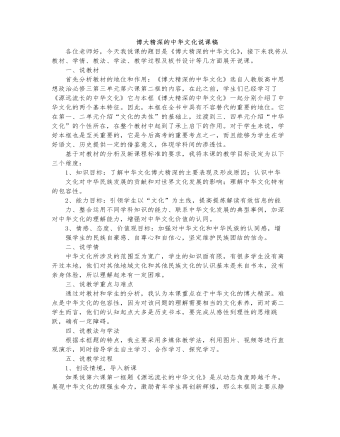
人教版高中政治必修3博大精深的中华文化说课稿
环节三:多媒体继续展示石窟艺术、民族文学等,学生在感受少数民族文化成就的过程中不难得出结论:各民族文化都为中华文化作出了重要贡献,都是中华民族的骄傲。由此进入第三目“中华之瑰宝,民族之骄傲”。各族人民对中华文化的认同感和归属感,显示了中华民族厚重的文化底蕴和强大的民族凝聚力。环节四:合作探究中华文化博大精深的原因。学生调动已有历史知识储备和课前搜集的材料分组交流:历史上在思想文化方面,对诸家学说所采取的兼收并蓄的学术主张;中国文化长期吸收周边少数民族的哪些优秀文明;在对待外域文化上,中华民族是否敞开博大胸怀扬弃吸收。2、从现代找出能充分体现中华民族的文化开放心态和中华文化非凡融合力的例子。这样可增添几分时代气息,更好地服务于当下实践。
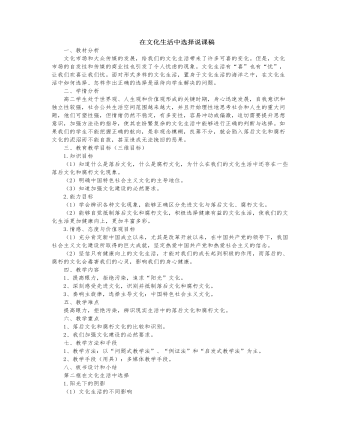
人教版高中政治必修3在文化生活中选择说课稿
一、教材分析文化市场和大众传媒的发展,给我们的文化生活带来了许多可喜的变化。但是,文化市场的自发性和传媒的商业性也引发了令人忧虑的现象。文化生活有“喜”也有“忧”,让我们欢喜让我们忧。面对形式多样的文化生活,置身于文化生活的海洋之中,在文化生活中如何选择、怎样作出正确的选择是亟待向学生解决的问题。二、学情分析高二学生处于世界观、人生观和价值观形成的关键时期,身心迅速发展,自我意识和独立性较强,社会公共生活空间范围越来越大,并且开始理性地思考社会和人生的重大问题,他们可塑性强,但情绪仍然不稳定,有多变性,容易冲动或偏激,迫切需要提升思想意识,加强方法论的指导,使其在纷繁复杂的文化生活中能够进行正确的判断与选择。如果我们的学生不能把握正确的航向,是非观念模糊,良莠不分,就会陷入落后文化和腐朽文化的泥沼而不能自拔,甚至造成无法挽回的恶果。

人教版高中政治必修3建设社会主义精神文明说课稿
最后,教师对这节课学习的内容做回顾总结,并让学生做几道练习题巩固一下新知识。依据:本节课主要是通过学生对关中文化的了解来学习我国的传统文化。所以我计划通过3-5分钟的设问导课让学生把注意力转变集中到课堂中,引导学生关注课堂。整体时间安排符合教育学中的最佳时间分配原理和反馈原理。这样做也有利于优化课堂结构、提高教学效率、把主要时间留给学生,把主动权还给学生。针对高三年级学生的层次差异,我进行了分层设置,设置有基础题和拔高题。这样做既可以使学生掌握基础知识,又可以使学有余力的学生有所提高,从而达到拔尖和“减负”的目的。板书设计板书就是微型教案,板书集中体现教学的三维目标、重难点、教学过程,体现教学的特色与特性。
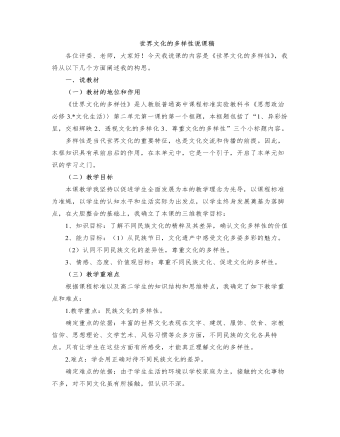
人教版高中政治必修3世界文化的多样性说课稿
设计意图:使同学从各届奥运会会徽的设计上看各国文化,让学生体会不同会徽体现的不同的民族文化,了解不同民族的文化特色,感悟文化多样性的价值,使学生产生情感认同,从而突破难点。探究活动5:教师多媒体呈现中法文化年的flash,显示中国到法国举办中国文化年的图片,比如:在法国街头出现了中国的京剧脸谱,中国孩子玩的风车,中国的大熊猫。出示法国到中国举办文化年的图片,比如:法国在北京举办的音乐会,法国空军的飞行表演等。学生讨论:中法文化年的举办对中法两国来说有什么现实意义?探究活动6:播放理查德.克莱德曼演奏的《梁山伯与祝英台》的视频讨论:(1)此曲吸引你之处在哪里?(2)由此可见,对待文化差异的正确态度是什么?活动5和活动6的设计意图在于让学生懂得,面对开放的世界,既要尊重本民族的文化,同时也要尊重其他民族的文化,从而突破难点。
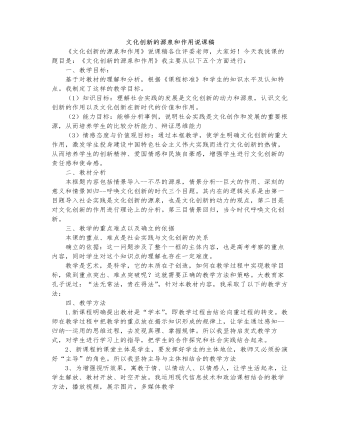
人教版高中政治必修3文化创新的源泉和作用说课稿
二、巨大的作用,深刻地意义材料展示:鲁迅在《狂人日记》中猛烈抨击“吃人”的封建礼教,力图通过自己的呐喊唤醒民众。高尔基早期的作品多描绘俄国沙皇制度下人民的痛苦和他们对美好生活的憧憬。20世纪初,俄国革命形势的发展使他讲文学的笔锋转向革命,创作了《母亲》等作品。合作探究:鲁迅和高尔基的作品在当时的中国和俄国分别起到了什么作用?列举喜爱的一些文学和艺术作品,说说创作者的意图是什么?引导学生自主阅读,培养自主学习能力,掌握分析归纳法和团结协作精神。学生回答之后师生共同总结:文化创新来源于社会实践,同也会对于社会实践产生新的影响,促进社会实践的变化,同时也繁荣了民族文化。所以文化创新的巨大作用一方面表现为推动社会实践的发展,另一方面表现为不断促进民族文化的繁荣。既然文化创新具有如此巨大的作用,那么作为新时代祖国的建设者为了繁荣民族文化,又该作些什么呢?进入本课第三目和教学的第三个环节。[情景回归参与生活]

人教版高中历史必修3新文化运动与马克思主义的传播说课稿
一、说教材(一)教材分析本课所介绍的新文化运动,是继上一节所学的《西学东渐和维新变法思想》之后中国另一波影响巨大的思想解放潮流,旨在向西方学习、寻求强国御侮之道。在整个知识体系中,它既是资产阶级领导的旧民主主义革命的补课,又是无产阶级领导的新民主主义革命的序曲。它所带来的思想的空前解放,也就为马克思主义的传播创造了条件,为中共的成立奠定基础。这一课的学习能让学生清晰认识新文化运动和马克思主义在近代中国思想解放历程中的重要作用和巨大影响。与必修一和必修二政治经济史的结合也能让使学生强化历史联系。新课程标准对本课就做了明确的规定:1、概述新文化运动的主要内容,探讨其对近代中国思想解放的影响。2、简述马克思主义在中国传播的史实,认识马克思主义对中国历史发展的重大意义。根据课标要求,我制定了以下具体的三维目标。
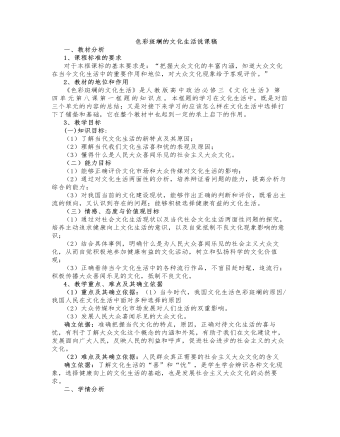
人教版高中政治必修3色彩斑斓的文化生活说课稿
五、板书设计第一节色彩斑斓的文化生活一.当代文化生活素描(现状、原因)1、现状(1)文化生产:色彩斑斓(2)文化消费:多种选择2、当代文化生活色彩斑斓的原因有哪些?/当代人们在文化生活中为什么会面对多种选择?(1)现代科学技术(2)大众传媒(3)社会主义市场经济的发展(4)现代文化产业的发展二.文化生活中的“喜”与“忧”1、喜(1)表现①它能满足人们日趋多样化的文化需求,充实人们的精神生活②它可以通过灵活而有吸引力的表现方式,传播科学文化知识③它便于采取群众喜闻乐见的方式,使人们潜移默化地接受正确的价值观念,提高思想道德素质④它易于引导人们的消费观念,推动生产的发展(2)原因:文化市场和大众传媒的发展2、忧(1)表现①有些部门和单位在经济利益的驱动下,不顾社会效益,肆意生产、销售品位低下的文化产品
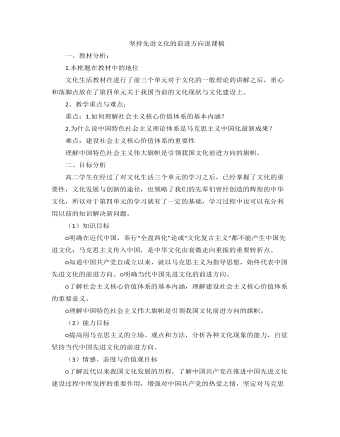
人教版高中政治必修3坚持先进文化的前进方向说课稿
教师点拨:是社会主义意识形态的本质体现,是全国人民团结奋斗的共同思想基础。④建设社会主义核心价值体系的要求设置探究问题:建设社会主义核心价值体系的要求有哪些?学生自主学习教材,得出结论板书:3建设社会主义核心价值体系的要求设计意图:在掌握了内容的基础上,这一部分知识的学习水到渠成。高举旗帜科学发展板书:1、中共引领文化前进方向的旗帜是——中国特色社会主义设置探究问题:高举中国特色社会主义伟大旗帜最根本的要求是什么?学生自主学习,回答问题板书:2高举中国特色社会主义伟大旗帜,最根本的是坚持中国特色社会主义理论体系。教师继续追问:这一理论体系的基本内涵是什么?能否举例说明这一理论体系有什么特点。学生讨论,教师点拨:这个理论体系,坚持和发展了马克思列宁主义、毛泽东思想,是马克思主义中国化最新成果。中国特色社会主义理论体系具有强大的生命力、创造力、感召力,是不断丰富和发展的马克思主义
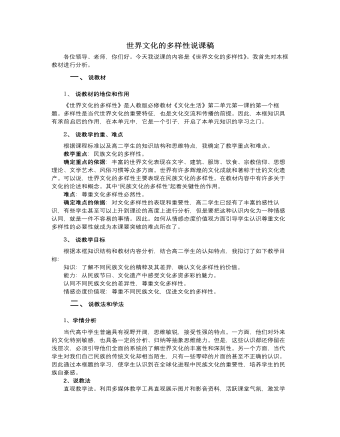
人教版高中政治必修3世界文化的多样性说课稿
1、 说教材的地位和作用《世界文化的多样性》是人教版必修教材《文化生活》第二单元第一课的第一个框题。多样性是当代世界文化的重要特征,也是文化交流和传播的前提。因此,本框知识具有承前启后的作用,在本单元中,它是一个引子,开启了本单元知识的学习之门。2、 说教学的重、难点根据课程标准以及高二学生的知识结构和思维特点,我确定了教学重点和难点。教学重点:民族文化的多样性。确定重点的依据:丰富的世界文化表现在文字、建筑、服饰、饮食、宗教信仰、思想理论、文学艺术、风俗习惯等众多方面。世界有许多辉煌的文化成就和著称于世的文化遗产。可以说,世界文化的多样性主要表现在民族文化的多样性。在教材内容中有许多关于文化的论述和概念。其中“民族文化的多样性”起着关键性的作用。难点:尊重文化多样性必然性。

人教A版高中数学必修一诱导公式教学设计(1)
一、复习回顾,温故知新1. 任意角三角函数的定义【答案】设角 它的终边与单位圆交于点 。那么(1) (2) 2.诱导公式一 ,其中, 。终边相同的角的同一三角函数值相等二、探索新知思考1:(1).终边相同的角的同一三角函数值有什么关系?【答案】相等(2).角 -α与α的终边 有何位置关系?【答案】终边关于x轴对称(3).角 与α的终边 有何位置关系?【答案】终边关于y轴对称(4).角 与α的终边 有何位置关系?【答案】终边关于原点对称思考2: 已知任意角α的终边与单位圆相交于点P(x, y),请同学们思考回答点P关于原点、x轴、y轴对称的三个点的坐标是什么?【答案】点P(x, y)关于原点对称点P1(-x, -y)点P(x, y)关于x轴对称点P2(x, -y) 点P(x, y)关于y轴对称点P3(-x, y)